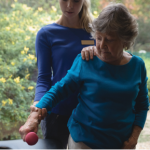Those friendships have kept her coming back to the Annual Meeting about every other year. She says, “We talk about research, teaching, clinics and our families. Many have visited Stockholm, and know my husband and my two sons. We’ve had a lot of fun over the years.”
In the early 1990s, the ARHP was the only organization that was reaching out to rheumatology health professionals. Today, EULAR devotes a vice president position to a health professional, a position Dr. Opava filled from 2013–2017. During that time she initiated the first formal collaboration between EULAR health professionals and ARHP on recommendations for the health professional’s approach to pain management in arthritis.
Dr. Opava received the ARHP distinguished Scholar Award in 2002 and the Ann Kunkel Advocacy Award in 2016, both milestones in her career.
Dr. Opava says membership in the ARHP taught her how to socialize with people from other countries. “It gave me confidence in that skill.”
Dr. Opava has supervised 11 PhD students to graduation and has performed extensive teaching at all levels at 15 universities in Sweden and other European countries, in America and in Asia. “Christina is inspiring and knowledgeable. She is the guru,” says Helene Alexanderson, RPT, associate professor, Karolinska Institutet, Sweden, and a former student of Dr. Opava. “She is one of the three people I have as a role model,” Dr. Alexanderson continues.
So what’s next for Dr. Opava? She’s helping plan a new series of studies that will focus on pain and lifestyle, including physical activity and diet. “Lifestyle has become an increasingly important focus for research,” she says. The plan is to start with qualitative interviews, then move on to registry-based studies and finally interventional studies. She’s working with a former PhD student to whom she plans to hand off the reins when she retires next year.
“I’ve done my part,” says Dr. Opava. “It’s time I give it over to the next generation.”
Dr. Opava is looking forward to focusing on interests and priorities outside work, such as livening up her exercise routine with bicycling and dancing. She may also move out of Stockholm and back to the southern edge of Sweden where she grew up.
She hopes people will remember that “I am a good person. Research is important, but being a good person is more important.” She pauses for a moment and says, “I hope they remember that I was fun, too.”



